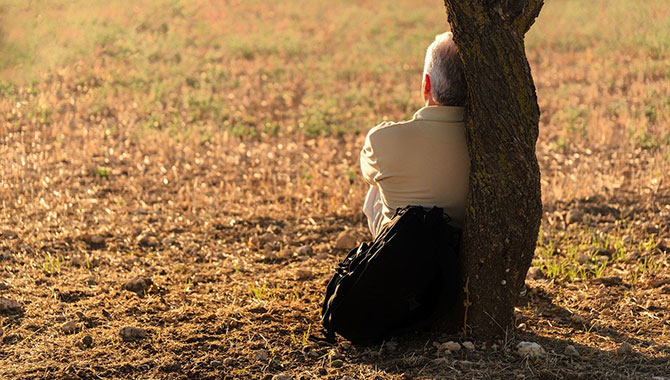Jesus’ mother, his aunt, Mary the wife of Clopas, and Mary Magdalene stood at the foot of the cross. – John 19:25
Healthy religion shows us what to do with our pain, our grief, our suffering. ~ Richard Rohr
Our son Ro has been running for the last thirteen years. Last Saturday, I drove to Orange City, Iowa, home of a world-famous tulip festival, for possibly his last cross-country race, the Great Plains Athletic Conference Championship. It was a crisp fall day. At the start of the 8-kilometer race, Ro went out with the lead pack. After a mile, I yelled at him, “Go Ro!” He nodded at me.
After two miles, Ro was still running in the lead pack with about twelve guys. As he ran by me, I hollered, “Go La Plata Mountains” which made him smile. Around three miles something happened, and Ro fell off the pace and I could see the intense pain in his face, and he looked like he was running in knee deep water. He slowed to a crawl as runners moved quickly by him. I wondered if he would be able to finish. At the end of the race Ro fell in exhaustion, pain, and disappointment as more runners passed by him. He got up and barely finished the race.
Ro was devastated and broken. “I don’t know what happened,” he said. “My legs were like lead.” Nothing’s harder for a parent then to see their kids in pain and to not be able to fix it or rescue them. Father Rolheiser writes, “All of us know the feeling of standing within a situation and being powerless, at least in that we are helpless to change anything practically.”
What can we do in a situation where it seems, anything we can say or do, will only make things worse?
The summer of my freshman year of high school, two of my classmates, Rob and Joe, died tragically in a swimming accident. I remember going to Rob’s house and then to Joe’s. The heaviness in their homes and the sorrow of their parents was unbearable. I didn’t know what to say or do. I felt helpless.
What do we say or do when a friend loses their much-needed job? What do we say or do when a loved one is diagnosed with a terminal illness? What do we say when we find ourselves swept up in a mean-spirited argument? What do we say or do when we are wounded physically, emotionally, or spiritually by life?
“What can we do in these situations? Nothing! Or, at least, so it seems. But perhaps nothing is enough,” reflects Rolheiser.
We see the prototype of this in Mary who stood at the foot of the cross during her son’s crucifixion. “Mary said not a single word; not, I suspect because she didn’t want to protest, but because there wasn’t anything that she could have said at that moment that would have made any difference,” says Rolheiser. “There was nothing she could do to stop the crucifixion. She’s not protesting to the bystanders, trying to explain her views of things. She’s powerless. Silent. All she can do is ponder, that is, hold the tension, stand silently amidst the misunderstanding, bigotry, and violence and, in that, try to gestate its opposite—understanding, compassion, and love.”
Is this fruitful and transformative, or is it just quiet resignation?
Richard Rohr says, “If we do not allow our pain, our suffering, and our grief to transform us, we will most assuredly transmit it—usually to those closest to us: our family, our friends, our co-workers, and sadly, our children. Mary at the foot of the cross and Jesus on the cross are classic images of transformative spirituality. They do not return hostility, hatred, accusations, or malice directed at them. They hold the suffering until it becomes resurrection.”
How often do we respond to anger with more anger? How often do we meet violence with more violence? Mary stands silently in love and compassion not resignation. How do we stand when we face sorrow, anger, or injustice?
Martin Luther King Jr. famously said, “Darkness cannot drive out darkness, only light can do that. Hate cannot drive out hate, only love can do that.” When we ponder and stand in silence, we create space for transformation to happen. “We wait for our hearts to do something action can’t, namely transmute misunderstanding into understanding, confusion into insight, anger into blessing, hatred into love, and sorrow into joy,” says Rolheiser.
“Sometimes there’s nothing to be done…but nothing can be enough, as it was for Mary under the cross.”
Ro and I rode in silence as the sun set. After awhile he said, “I’ll be all right. It was just a race. The last time I died in a race, I was a wreck for weeks.” And we talked about all the joys and sorrows over the last thirteen years of running in races. “I think running has taught me a lot about dealing with all the highs and lows in life.” “Yes, it does,” I said.
May we ponder.
May we let our sorrows and pain transform us instead of transmitting our pain to others.
May grace renew our hearts.
Blessings and peace,
Craig

